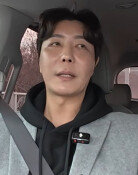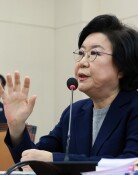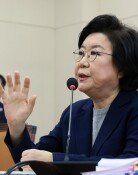President Roh Backs Military Reforms
President Roh Backs Military Reforms
Posted October. 03, 2005 03:15,
President Roh has mentioned the possibility of exercising wartime operational control, which currently belongs to the Commander-in-Chief (CinC) of the Combined Forces Command (CFC). The presidents remarks are drawing much attention.
On October 1, the celebrations of the 57th Armed Forces Day were held at Gyeryongdae, a military base. In his address to the ceremony, the president emphasized, The (recently publicized) proposal for military reforms reflects our enthusiasm for an independent national defense. We aim to transform the ROK Armed Forces into forces able to secure peace on the peninsula on their own, in particular, by exercising wartime operational control.
On the peninsula, there exists mistrust and confrontation. To overcome such obstacles and bring about peace and prosperity to the area, it is critical for Korea to be determined and active, the president said.
In the past, President Roh brought up the subject of reclaiming wartime operational control. But this is the first time the word exercise came out of a Korean presidents mouth.
During the Kim Young-sam administration in 1994, Korea took back peacetime operational control, which had been part of the authority of the CinC of the CFC since the signing of the ROK-U.S. Mutual Defense Agreement (1953), and had formerly consisted of operational control over the ROK Armed Forces with wartime control. Wartime operational control is still in the hands of the CinC of the Combined Forces.
The United States Armed Forces Commander in Korea (a general of the United States) assumes the offices of both CinC of the CFC and CinC of the U.N. Forces in Korea.
One prevailing view in the Korean forces is that the president has mentioned the exercise of wartime operational control because he has been considering military reforms that focus on the idea of enhancing the capability to independently carry out operations at the order of the Joint Chiefs of Staff of the Korean Armed Forces. In short, the authorities regard wartime operational control a central piece of an independent defense since proposed reform measures are centered on the notion of independence.
Recovering wartime operational control is a key to an independent defense. President Roh has repeatedly emphasized it as part of his agenda for the future, said Kim Man-su, a Chung Wa Dae spokesman in a briefing.
The USFKs 10 major duties, including the patrol around the Joint Security Area (JSA) at Panmunjeom, will be transferred to Korean forces by the end of next year. Under the circumstances, some suggest that it is time to start the negotiating process over regaining wartime operational control.
Nonetheless, some others think that Koreas high-tech war capabilities are not sufficient enough to properly exercise wartime operational control. They point out that bringing up the subject of exercising the wartime operational control at the present might send an unnecessarily wrong signal to the U.S., jeopardizing the U.S.-Korea alliance.
The matter of regaining wartime operational control must be pushed forward carefully with a proper amount of attention being paid to the security conditions. There is no full-fledged discussion over the issue yet, said a Ministry of National Defense official.
The U.S.-Korea alliance has given much help to exploring ways of solving the North Korean nuclear problem and to setting the basis for peace and prosperity in Northeast Asia. The alliance will continue to prosper as a comprehensive, dynamic, and reciprocal union, added President Roh in his Armed Forces Day speech.
Yeon-Wook Jung Sang-Ho Yun jyw11@donga.com ysh1005@donga.com





![하버드 의사가 실천하는 ‘뇌 노화 늦추는 6가지 습관’ [노화설계]](https://dimg.donga.com/c/138/175/90/1/wps/NEWS/IMAGE/2026/01/22/133210626.3.jpg)

